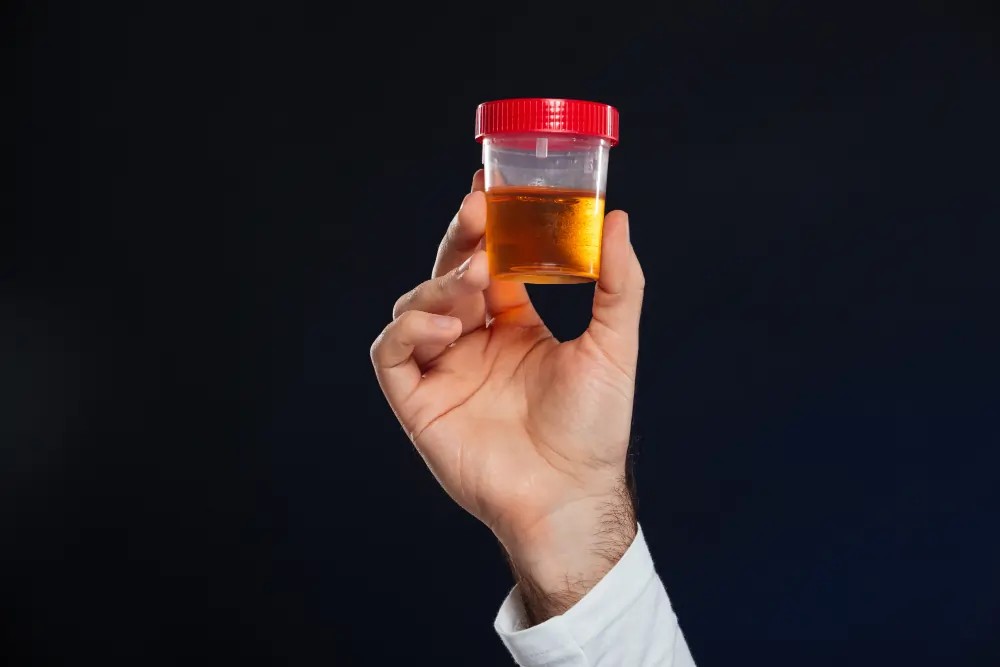
Introduction
The liver – an unassuming organ nestled beneath our ribcage – quietly performs a symphony of essential tasks. From detoxification to nutrient processing, it’s the unsung hero that keeps our bodies running smoothly. On World Liver Day, observed annually on April 19th, let’s shine a spotlight on this remarkable organ. We’ll explore the warning signs your liver might be sending you – signs that warrant immediate attention and care.
1. Fatigue and Weakness: When Energy Ebbs Away on World Liver Day
Sign: Persistent fatigue and weakness.
Why It Matters: Your liver is a metabolic powerhouse. When it falters, you feel drained.
Action Steps:
- Prioritize rest and quality sleep.
- Consult a healthcare provider to explore potential liver-related causes.
The liver, our body’s multitasking marvel, orchestrates a complex dance of biochemical reactions. It metabolizes nutrients, detoxifies harmful substances, and synthesizes essential proteins. But what happens when this silent workhorse stumbles? Fatigue and weakness creep in, casting a shadow over our vitality.
When your liver functions optimally, you wake up refreshed, ready to seize the day. But when it falters, energy wanes, and even mundane tasks become Herculean feats. Pay heed to this whisper from within – persistent fatigue is your liver’s SOS signal. It’s time to investigate.
2. Jaundice: When Yellow Takes Center Stage
Sign: Yellowing of the skin and eyes (jaundice).
Why It Matters: Jaundice occurs when bilirubin accumulates due to liver dysfunction. It’s a clear signal that something needs attention.
Action Steps:
- Seek medical evaluation promptly.
- Investigate the underlying cause.
Picture this: a subtle yellow hue creeping across your skin and eyes. Jaundice – the telltale sign of bilirubin buildup. Normally, your liver processes bilirubin, a byproduct of red blood cell breakdown. But when the liver stumbles, bilirubin lingers, casting its golden shadow. Don’t dismiss jaundice as mere aesthetics; it’s your liver’s cry for help. Consult a healthcare professional promptly. They’ll unravel the mystery behind the yellow curtain.
3. Abdominal Pain and Swelling: Listen to Your Gut
Sign: Unexplained abdominal discomfort, bloating, or swelling.
Why It Matters: Liver inflammation or fluid retention can manifest as abdominal woes.
Action Steps:
- Consult a doctor for a thorough assessment.
- Maintain a balanced diet and limit alcohol intake.
Your liver resides in the upper right quadrant of your abdomen, a diligent sentinel guarding your well-being. When it’s unhappy, it sends distress signals – a dull ache, bloating, or subtle swelling. Perhaps you’ve dismissed these as everyday nuisances. But listen closely; they might be your liver’s Morse code. Consult a physician; they’ll decipher the message and guide you toward healing.
4. Dark Urine: A Colorful Clue

Sign: Urine darker than usual.
Why It Matters: Dark urine hints at liver trouble, as bilirubin affects urine color.
Action Steps:
- Stay hydrated.
- Monitor urine color and seek professional advice if it persists.
Next time you visit the bathroom, glance into the toilet bowl. Is your urine darker than usual? Bilirubin, that yellow pigment, usually exits through urine. But when liver function wavers, bilirubin lingers, tinting your liquid waste. Dark urine – a subtle SOS from your liver. Hydrate well, and if the color persists, consult a healthcare provider. It’s a small clue with big implications.
5. Pale Stools: A Subtle Indicator
Sign: Light-colored or clay-like stools.
Why It Matters: Pale stools suggest bile flow obstruction, often linked to liver issues.
Action Steps:
- Pay attention to changes in stool color.
- Consult a healthcare professional for further evaluation.
Your morning routine unveils more than you realize. Pale, clay-like stools – a subtle sign that your liver’s intricate machinery may be misaligned. Bile, essential for digestion, flows through your liver and gallbladder. But when obstacles arise, your stools lose their natural hue. Don’t ignore this whisper from your gut. Consult a professional; they’ll decode the message hidden in your porcelain canvas.
6. Unexplained Weight Loss: A Metabolic Mystery
Sign: Unintended weight loss.
Why It Matters: Liver dysfunction disrupts metabolism, leading to weight changes.
Action Steps:
- Monitor your weight.
- Discuss significant changes with your healthcare provider.
Weight loss – a double-edged sword. While shedding excess pounds is often a goal, unexplained weight loss can be disconcerting. Your liver, intricately involved in metabolism, plays a pivotal role. When it stumbles, metabolic pathways falter. Energy production wanes, and the scale tips downward. Perhaps you’ve noticed your clothes fitting differently or the numbers on the scale dwindling. Don’t ignore this silent transformation. Consult your healthcare provider; they’ll unravel the metabolic mystery and guide you toward stability.
7. Nausea and Vomiting: Trust Your Gut Feelings
Sign: Persistent nausea, vomiting, or loss of appetite.
Why It Matters: These symptoms may be liver-related.
Action Steps:
- Seek medical advice promptly.
- Maintain a nutritious diet and stay hydrated.
Nausea – that queasy feeling that disrupts your day. Vomiting – an unwelcome guest at life’s banquet. Your liver, intricately connected to digestion, influences these sensations. When it falters, bile flow may be disrupted, upsetting your stomach. Perhaps you’ve lost interest in food, or meals trigger waves of nausea. Trust your gut – it might be signaling liver distress. Consult a healthcare professional promptly. They’ll assess the situation, address your symptoms, and ensure proper nourishment.
8. Itchy Skin: When Scratching Isn’t Enough

Sign: Intense itching, especially without a visible rash.
Why It Matters: Liver disease can cause relentless skin itching.
Action Steps:
- Resist excessive scratching.
- Consult a dermatologist or hepatologist.
Picture this: an itch that defies logic. Your skin crawls, yet no rash appears. Your liver, the orchestrator of detoxification, occasionally misfires. When it does, toxins accumulate, triggering skin irritation. Itchy palms, restless nights – your liver’s subtle SOS. Resist the urge to scratch; it won’t quell the internal turmoil. Instead, consult a specialist. They’ll decode the itch’s cryptic language and restore harmony within.
9. Spider Angiomas: A Web of Clues
Sign: Small, red spider-like blood vessels on the skin.
Why It Matters: These may indicate liver issues.
Action Steps:
- Take note of visual cues.
- Discuss with a healthcare provider.
Spider angiomas – delicate crimson threads branching across your skin. Their origin? Your liver’s intricate vascular network. When liver function wavers, blood vessels dilate, creating these arachnid-like patterns. Perhaps you’ve noticed them on your chest or face. Don’t dismiss them as mere aesthetics. They’re whispers from within, hinting at liver health. Take note, and share your observations with a healthcare provider. They’ll weave together the clues and guide you toward comprehensive care.
10. Easy Bruising and Bleeding: A Clotting Conundrum
Sign: Easy bruising or unexplained bleeding.
Why It Matters: Liver dysfunction affects blood clotting.
Action Steps:
- Be cautious to prevent injuries.
- Consult a doctor if you notice frequent bruising or bleeding.
Your liver, a master conductor in the symphony of clotting, ensures your blood dances harmoniously. But when it stumbles, the rhythm falters. Easy bruising – a gentle touch leaves behind a vivid mark. Unexplained bleeding – a paper cut turns into a crimson stream. These signs, seemingly innocuous, hint at liver involvement. Be cautious; prevent injuries. And if the bruises multiply or bleeding persists, seek professional guidance. Your liver’s orchestra needs a skilled conductor.
Conclusion
On this World Liver Day, let’s celebrate our unsung hero – the liver. Regular check-ups, a wholesome diet, and lifestyle adjustments can significantly impact liver health. Remember, your liver whispers its needs; it’s time to listen and prioritize your well-being.
FAQs
- Q: What are the early signs of fatty liver disease?
- A: Early indicators of fatty liver disease can often go unnoticed. However, watch out for slightly enlarged liver (detectable during a physical examination), dark-colored urine, unexplained weight loss, and persistent abdominal discomfort.
- Q: How can I detect liver issues early?
- A: Regular check-ups and diagnostic tests are essential. Pay attention to signs like dark urine, abdominal uneasiness, and unexplained weight loss. Remember, outward manifestations may not always be present, so routine monitoring matters.
- Q: What is the significance of dark urine in liver health?
- A: Dark urine may indicate underlying liver issues, including fatty liver disease. If you notice this change, seek further investigation and consult a healthcare provider.
- Q: Can liver dysfunction cause unexplained weight loss?
- A: Yes, unexpected weight loss, especially when not attributed to diet or exercise changes, could signal liver dysfunction, including fatty liver disease. Monitoring weight changes is crucial.
- Q: Why is itchy skin relevant to liver health?
- A: Intense itching, especially without a visible rash, can be a sign of liver disease. When your liver struggles, toxins accumulate, triggering skin irritation. Consult a dermatologist or hepatologist if you experience persistent itching.



 Afrikaans
Afrikaans Albanian
Albanian Amharic
Amharic Arabic
Arabic Armenian
Armenian Azerbaijani
Azerbaijani Basque
Basque Belarusian
Belarusian Bengali
Bengali Bosnian
Bosnian Bulgarian
Bulgarian Catalan
Catalan Cebuano
Cebuano Chichewa
Chichewa Chinese (Simplified)
Chinese (Simplified) Chinese (Traditional)
Chinese (Traditional) Corsican
Corsican Croatian
Croatian Czech
Czech Danish
Danish Dutch
Dutch English
English Esperanto
Esperanto Estonian
Estonian Filipino
Filipino Finnish
Finnish French
French Frisian
Frisian Galician
Galician Georgian
Georgian German
German Greek
Greek Gujarati
Gujarati Haitian Creole
Haitian Creole Hausa
Hausa Hawaiian
Hawaiian Hebrew
Hebrew Hindi
Hindi Hmong
Hmong Hungarian
Hungarian Icelandic
Icelandic Igbo
Igbo Indonesian
Indonesian Irish
Irish Italian
Italian Japanese
Japanese Javanese
Javanese Kannada
Kannada Kazakh
Kazakh Khmer
Khmer Korean
Korean Kurdish (Kurmanji)
Kurdish (Kurmanji) Kyrgyz
Kyrgyz Lao
Lao Latin
Latin Latvian
Latvian Lithuanian
Lithuanian Luxembourgish
Luxembourgish Macedonian
Macedonian Malagasy
Malagasy Malay
Malay Malayalam
Malayalam Maltese
Maltese Maori
Maori Marathi
Marathi Mongolian
Mongolian Myanmar (Burmese)
Myanmar (Burmese) Nepali
Nepali Norwegian
Norwegian Pashto
Pashto Persian
Persian Polish
Polish Portuguese
Portuguese Punjabi
Punjabi Romanian
Romanian Russian
Russian Samoan
Samoan Scottish Gaelic
Scottish Gaelic Serbian
Serbian Sesotho
Sesotho Shona
Shona Sindhi
Sindhi Sinhala
Sinhala Slovak
Slovak Slovenian
Slovenian Somali
Somali Spanish
Spanish Sundanese
Sundanese Swahili
Swahili Swedish
Swedish Tajik
Tajik Tamil
Tamil Telugu
Telugu Thai
Thai Turkish
Turkish Ukrainian
Ukrainian Urdu
Urdu Uzbek
Uzbek Vietnamese
Vietnamese Welsh
Welsh Xhosa
Xhosa Yiddish
Yiddish Yoruba
Yoruba Zulu
Zulu